#the second world was the ussr
Text
I know I'm a week late but I do think people are misunderstanding the point of the Anthony Bourdain quote about Kissinger
The point was never "Anthony Bourdain has good politics and is an unproblematic fave," the point is that even someone with mainstream liberalish politics who goes to Cambodia for a food tour - a, let's be honest, very bougie type of trip to be part of your job - and has a basic understanding of history and a bare minimum of human decency can come away from that bougie food tour wanting to murder Henry Kissinger with their bare hands. The point is that Henry Kissinger fucked up this country so bad the only reason he wasn't lynched decades ago is because it's on the opposite side of the world and the people who were in proximity to him never really saw what it was. The point is that if we could see firsthand what our First World politics do to the Third World we would understand that monsters walk among us and it's a cultural failing that we let them die at home at 100 years old surrounded by their friends and family.
#henry kissinger#the unifying theory of fuck that guy#i use first and third world intentionally here because that is the exact political structure in play#first world didn't mean rich or privileged or important#it meant the us and its allies#the second world was the ussr#and the third world was the countries we were fighting over in the quote-unquote cold war
7K notes
·
View notes
Text
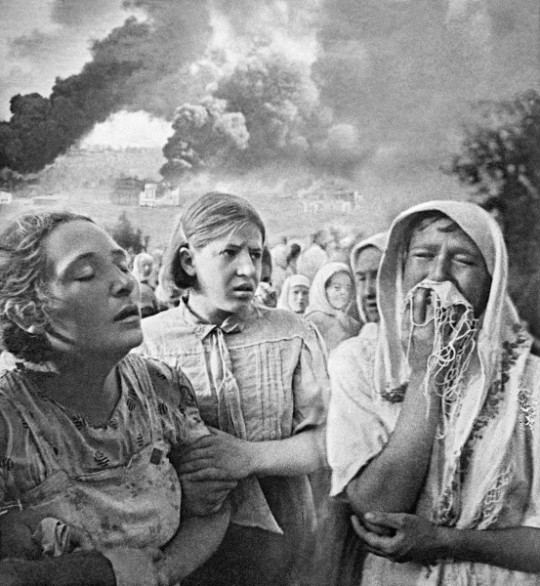
Kyiv, Ukraine burns. World War II. 1941.
#ukrainian history#war in ukraine#second world war#kyiv#1940s#old photo#black and white#vintage photography#soviet union#ussr#operation barbarossa#1941#eastern europe
56 notes
·
View notes
Text
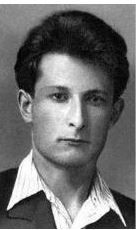
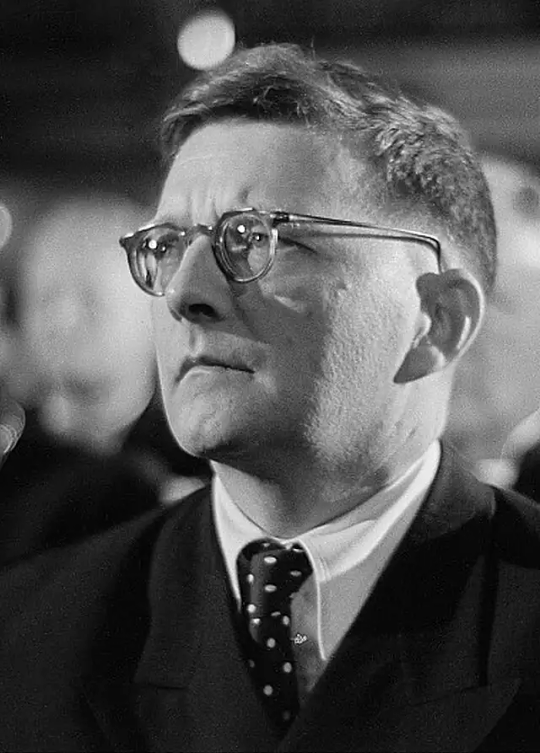
While you may recognize famed Russian composer Dmitri Shostakovich (right), it's less likely that you know the man on the left.
In 1937, Shostakovich took up a position teaching composition at the Leningrad Conservatory. Come 1939, one of his students was a young man by the name of Veniamin Fleishman (left). While studying under Shostakovich, Fleishman began working on a one-act opera called Rothschild's Violin, based on the story of the same name by Anton Chekov. However the Nazi invasion of the USSR in 1941 forced Fleishman to put his composition aside and he enlisted in the Red Army within the first days of the war. He would never finish his beloved Rothschild's Violin, as he was sent to the front and killed on September 14th 1941.
During his time at the Conservatory, Fleishman proved himself to be a promising young composer, and Shostakovich would soon look back and scold himself for not taking Fleishman's incomplete manuscript out of Leningrad with him when he fled. Luckily, he still had connections in the besieged Leningrad, and soon had the manuscript sent to his residence in Moscow. Shostakovich, in memory of Fleishman, completed the manuscript in 1944.
While he seldom used it for personal gain, Shostakovich made use of his influence and public stature to make sure that Fleishman's opera was recognized. Dmitri Shostakovich's insistence that the opera be published and performed made sure that Veniamin Fleishman's memory would not die along with him.
#dmitri shostakovich#shostakovich#classical music#history#second world war#music#soviet union#ussr#russia#wwii#ww2#rothschilds violin#leningrad#veniamin fleishman
36 notes
·
View notes
Text
After WW2 — from 1946 to at least 1948 —Britain re-opened German concentration camps and imprisoned suspected communists and Soviet sympathizers.
Women were tortured in these camps.
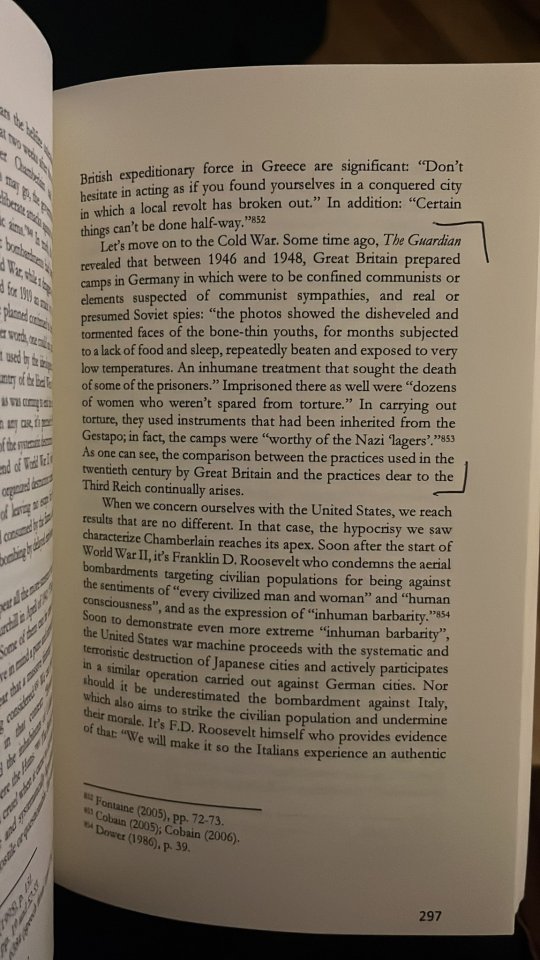
From the book «Stalin: The History and Critique of a Black Legend» by Domenico Losurdo.
The book can be downloaded for free in .pdf-format HERE!
387 notes
·
View notes
Text
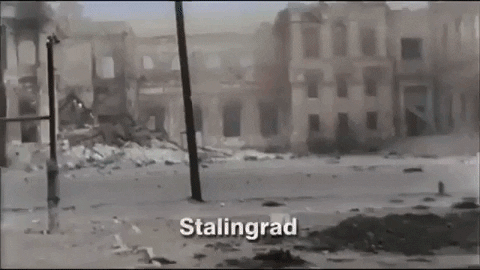
#stalingrad#CCCP#USSR#WWII#WW II#second world war#ruins#ruin#decay#destruction#my gif#gifs#gif#apocalypse#documentary#WW 2#conflict#world war#Conflict of Nations
88 notes
·
View notes
Text

Tankies: as communists we sincerely believe that all human beings deserve to live a dignified life….
Also tankies: our favourite mass murderers didn't kill enough Polish people so let's exterminate the entire population of Poland….
#katyn#katyń#katyn massacre#katyń massacre#history#bad history take#tankie#clown#tankie clownland#keyboard warrior#useful idiot#ignorance is strength#second world war#world war 2#poland#polska#russia#belarus#ukraine#ussr#soviet union#nkvd#stalin#war crime#twitter#x
48 notes
·
View notes
Photo
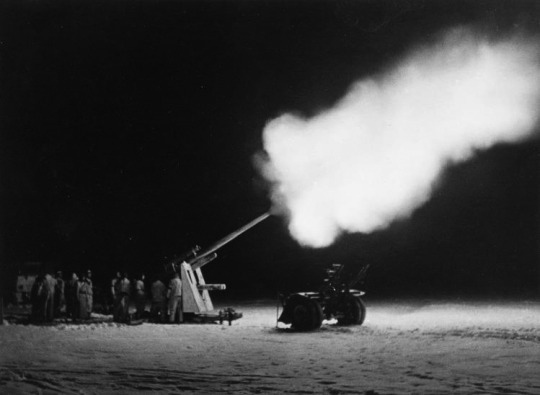
Walter Henisch. Flak of the German Wehrmacht in Russia. Rhzew. C. 1942
Follow my new AI-related project «Collective memories»
#BW#Black and White#Preto e Branco#Noir et Blanc#黒と白#Schwarzweiß#retro#vintage#Walter Henisch#Wehrmacht#Russia#countryhumans ussr#World War Two#Second World War#war#guerra#Rhzew#1942#1940s#40s#history#histoire#história#Geschichte#歴史#historical#historisch#histórico#historique
32 notes
·
View notes
Text
i still think about countryhumans btw its mostly just worldbuilding shit now. i love worldbuilding
#essen talks#morocco keeps getting revived in different time periods and its freaking her out. nobody has any idea whats going on#allied-occupied germany existed briefly in the real world but merely a vessel for east and west to fester within. perhaps he was a brief-#revival of weimar i think that would be funny#speaking of weimar i believe that in his final few months of living he began acting more and more like tr and so when tr finally “took over#nobody even batted an eye. they only realized weimar died over a decade ago when tr finally killed himself and the body refused to-#auto-disintigrate. which freaked out everyone btw#while the warsaw pact was supposed to die july 1st‚ she stuck around to welcome the ussr to the afterlife. the higherups couldnt decide-#which patron continental principality would greet him and so unlike tradition‚ a lower angel stepped up. she disintegrated immediately afte#i should probably talk about the organization angels more actualyl#the “angels” in this universe are just organizations. they know their lifespan the second they are created and mainly keep things in order.#when they die they disintegrate back into the void and leave behind a gem to be given to the last country that saw them alive.#angel death is rather beautiful to countries. its sort of like stained glass idk how to describe it#anyways rambling over byeee
5 notes
·
View notes
Text
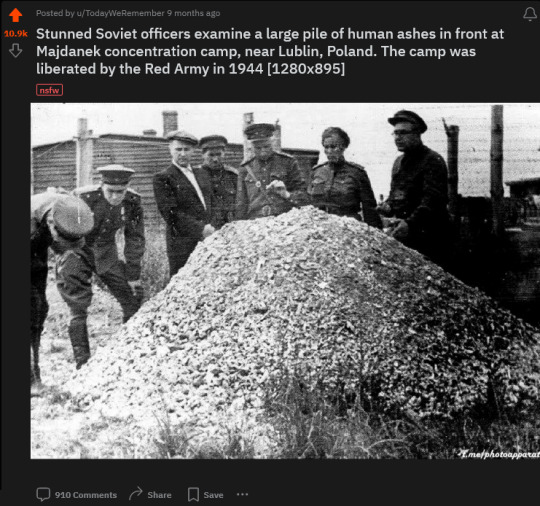
#soviet union#anti capitalism#leftism#socialism#communism#anarchy#history#ussr#soviet#ww2 germany#post ww2#ww2 art#ww2 history#second world war#ww2#wwii#world war ii#wwii history#world war 2#german army#world war two
2 notes
·
View notes
Text
The Winter War's Turning Point: The Fall of the Red Army's 44th Division
Welcome back to our Winter War podcast series. In this episode, we dive into the first week of January 1940, a pivotal moment in the Soviet-Finnish conflict. Here, we witness the profound struggles of the Red Army against the tenacious Finnish defenders, highlighting the use of innovative tactics like the Motti attack system and the famous Molotov cocktail.
The Stalled Russian Invasion
Contrary…
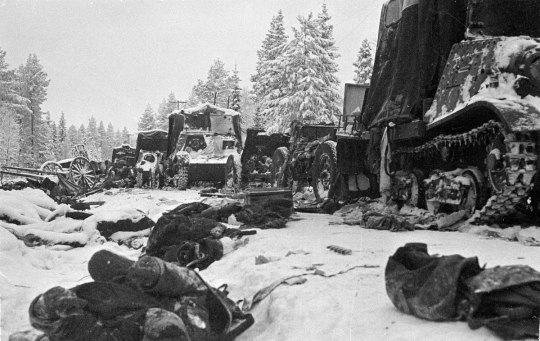
View On WordPress
#2nd WW#Russia invades Finland#Second World War#Stalin#Suomussalmi#The Raate Road#The Russo-Finnish War of 1939#The Winter War#USSR
0 notes
Text
The soviet Union
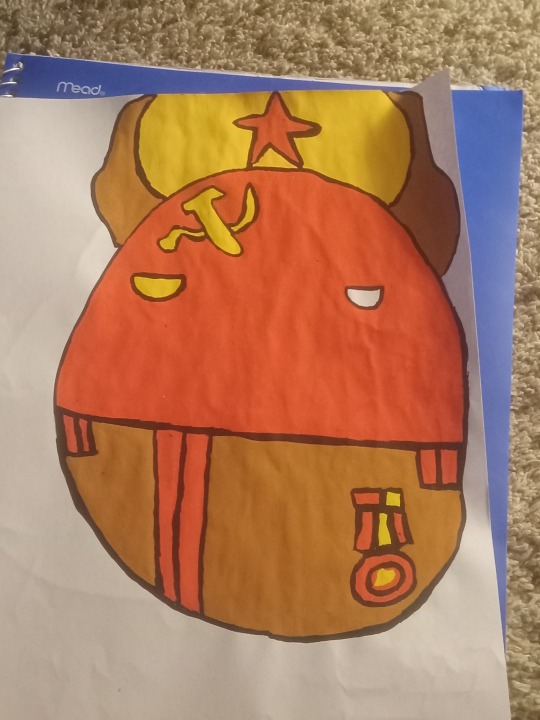
I know it doesn't look good but I tried my best.
0 notes
Text
It's all about the number 2

Asa and Yoru, Nayuta and Denji, two Chainsaw Man, two camps of worshippers versus detractors, two protagonists, a second part, the two identities of Denji, a high-school student and a hero himself, both demon and human: Chainsaw - Man.
But before we balance all that, let's take a closer look at this chapter.

First of all, I'd like to say how rich chapter 140 is. I see a lot of people criticizing Fujimoto's writing as someone who simply sets up absurd situations when absolutely nothing is left to chance. We're reading a manga by a film buff, so get your head around Chekov's rifle.
I'd like to remind you that Chainsaw Man is set in Japanese society.
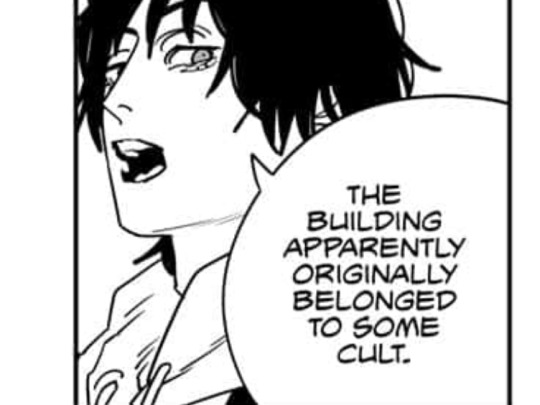
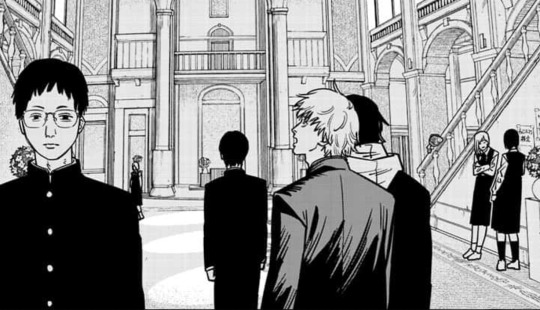
Ejecting a sect from a building, or even belonging to a cult that has nothing to do with a dominant, ancestral religion, is more common than in the West.
I've seen plenty of people wondering who could be at the head of the church for making people believe such a stupid story as a violet-ray weapon that would make adults stupid.
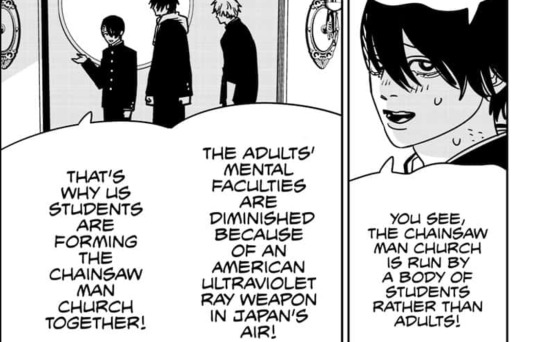
When it's the other way around, the church is exploiting the fact that high-school students are just thinking too much. And if there's one thing that saves Denji, it's that he thinks less.
Let's put things in context: this is the '90s, and even if the idea of nuclear weapons has been erased by Pochita, meaning that the Cold War has surely taken a different form in Chainsaw Man, Fujimoto has never denied geopolitical tensions.
Whether it's the mention of the USSR with Reze, Makima's instrumentalization of Japan, the history of weapons, the fact that the American government sought to eliminate Makima or that countries share the remains of the weapon demon...
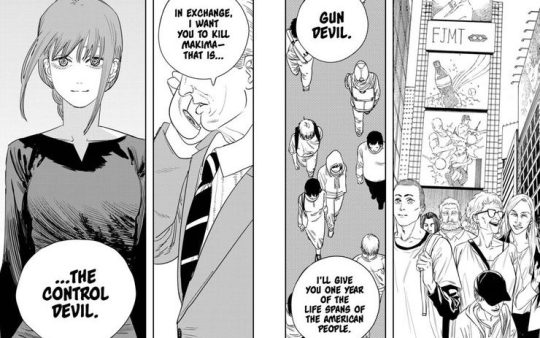
Countries are in tension. The church exploits this atmosphere of anxiety among teenagers who are beginning to form opinions that dissent from their parents.
Adolescence means coming into conflict with your parents' ideas, so come up with a story about how a gun makes them stupid. It's simply targeted manipulation that exploits the vulnerabilities of individuals in the midst of an identity crisis.
Becoming a teenager also means freeing oneself from a certain carefree attitude and better understanding of the world around us, hence the mention of Americans on the same level as adults.


I'd like to point out that this is not just a collection of absurdities. But for that, a bit of history... I hope I'm not teaching anyone that Japanese society has been turned upside down by the United States.
Without going into too much detail, during the 19th century, Japan went through the Meiji era. The Meiji government pursued a policy of modernization with the ultimate aim of bringing Japan up to the level of the Western powers.
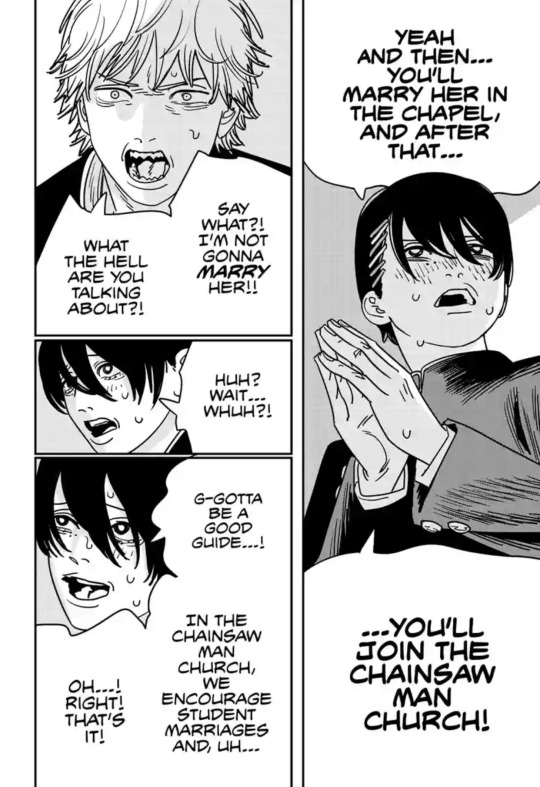
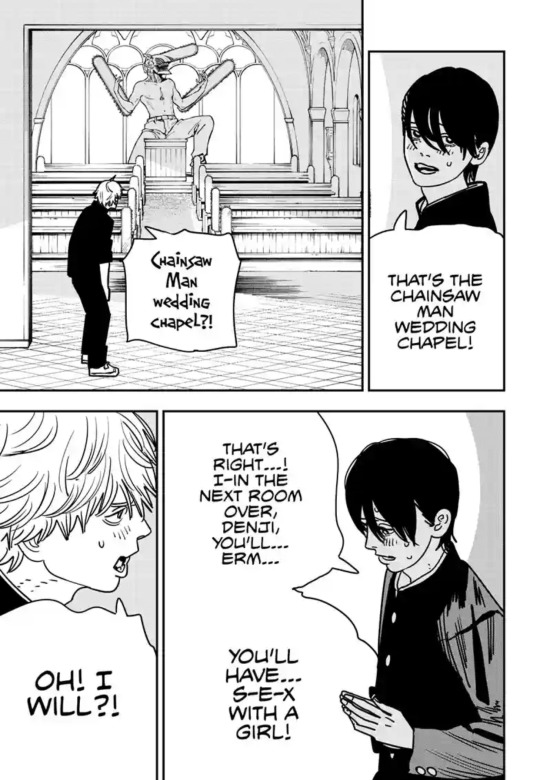
To compete with Western powers such as the United States, the government relied on centralized power to control citizens as much as possible... and this involved reforming the matrimonial system. With the popularization of "love marriage", the Meiji government changed tactics: the polygamous system was replaced by exclusive "love marriage".
The church used the same method of control as the Meiji government: reforming the matrimonial system by overturning institutions. From now on, it's no longer sex after marriage, but before it.

It's this kind of talk that just digs into the cracks that allows them to be brainwashed. But talk has never worked with Denji, who thinks concretely with what he can grasp. A date with a pretty girl, steak, sex, feeling the buttocks when he does the chair. What one would point to as perversity is what saves Denji. He thinks through his senses, his literal needs, not the abstract.
We can't say that Miri, who thinks he's free when he's being instrumentalized, repeating that it's the Americans' fault again, or asking Chainsaw Man if he's sure he hasn't picked up any ultraviolet weapons... that he’s stupid. Because weapons have lost their memory, they have no loved ones, no stories to refer to.
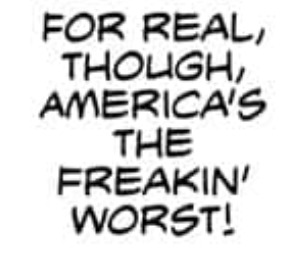


Miri convinces himself he's free, filling the void of his own forgotten history with false stories. The lack of education, of pillars, of history is what had tortured Denji, who was so easily manipulated. I'd go so far as to say that Reze is the most striking example of this.
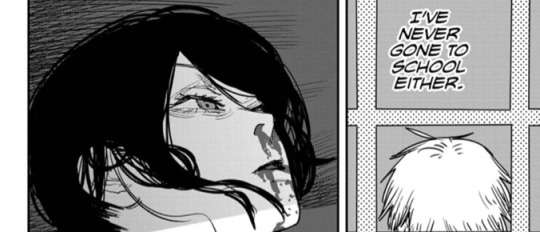
It's impossible to determine Barem's psychology, but he still demonstrates a third reaction to manipulation: while Denji evolves, Miri locks himself in denial : Barem manipulates in return. Revenge, reproductive mechanism, any number of reasons could explain why Barem exploits one of Denji's weaknesses: Asa.
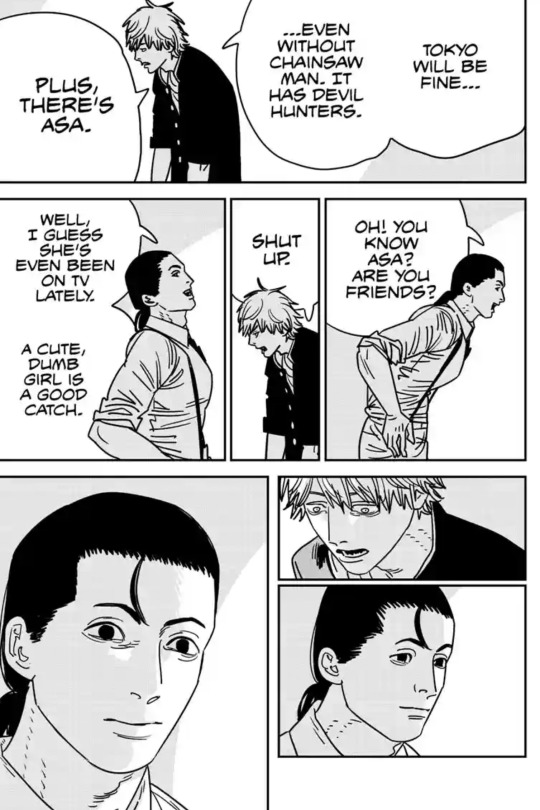
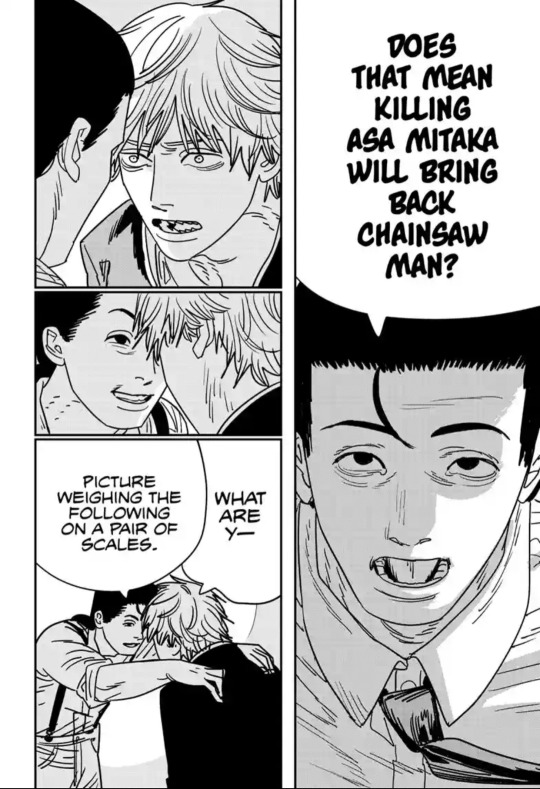
Now you're thinking, yes, that's all very well, you talk a lot... but what's that got to do with the number two?
The scale is the very image of dichotomy, of a relationship between two forces, two weights, two entities. And what does it have to do with manipulation? Several things.

First of all, manipulation also means taking on ideas that are not our own. It means no longer questioning them, confronting them with dissident ideas that would contradict them, or balancing them.
To balance is also to confront two options in a dilemma. Something that's come up several times, first initiated by Yoshida, then taken up in his own way by Barem: embrace his identity as Chainsaw Man or continue his normal life as Denji?
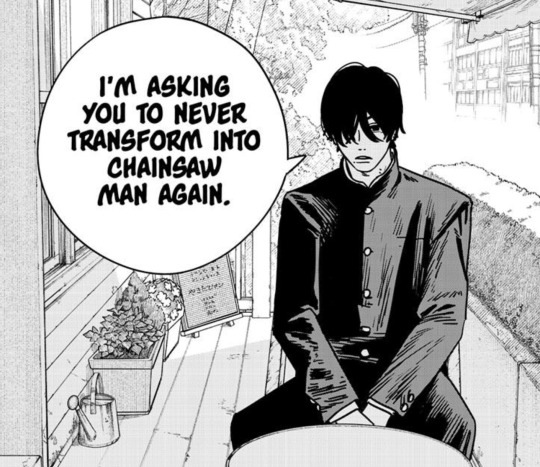
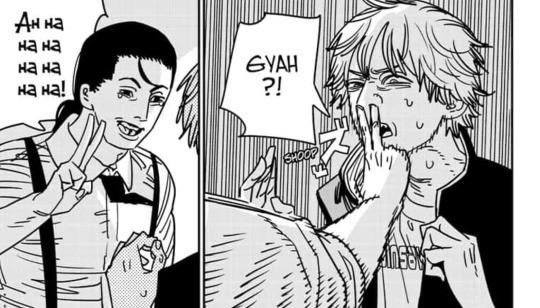
The manipulation since the start of Part 2 has been to split up Chainsaw Man. To have separated what constitutes his essence: human and demonic. To have split his nature, which has always been that of two beings in one.
And what if I told you that the answer lies in chapter 2 (yes, man). Here, Makima clearly explains to Denji that Pochita is not dead but continues to live with him, that he has two smells.
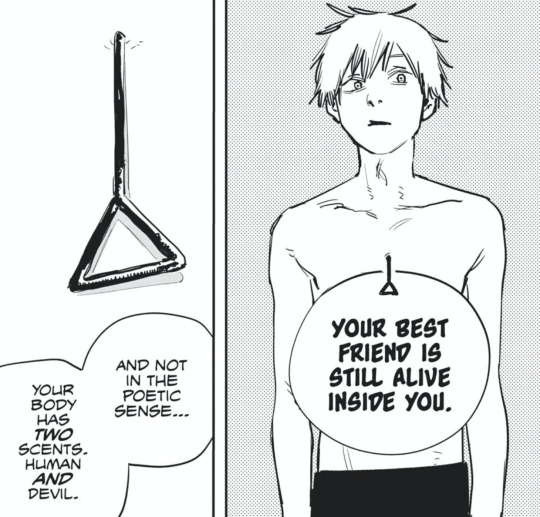

Fami's project is openly to separate Chainsaw Man, to cut its essence in two: the reunion of two beings.
That's why this chapter talks about marriage, which refers to the reunion of two individuals.
Barem would have us believe that these two choices are antinomic, that they are contradictory and cannot be fulfilled together. Only Denji can have both choices, he had already answered that. His sign of strength is two fingers. Two is Denji's strength. Becoming two is what literally allowed him to be reborn.
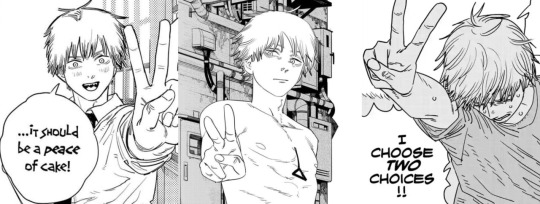
Of course, Denji doesn't want to marry; he's already one with one being through a contract: Pochita.
Pochita had merged with him so that he could live a normal life. It was never a normal life, but the life Denji wanted to live. Chainsaw Man is literally the means, a better life, the end.
The secret to surviving the manipulation then lies literally in Denji's heart.

#chainsaw man#csm#csm part 2#csm spoilers#csm 140#my thoughts#denji#yoru#asa#nayuta#makima#miri sugo#barem#reze
1K notes
·
View notes
Note
thoughts on anarchism?
The anarchists I've met IRL, especially while organizing, have been some of the most wonderful comrades and I wouldn't hesitate to work with them again. I'm sure there's many online too who're just like them. I do admire how quickly they are willing to use direct action, even if it's not the best tactic to be used or the only means to an end. Some anarchist ideas, while not necessarily achievable on a large scale, are certainly is very helpful for short term, small scale survival, like mutual aid for example.
Anarchism as an ideology though, I do have strong disagreements with. When I was first dipping my toes into studying political-economy, I had a very brief time where I was following both anarchist and marxist accounts and forums. And often, when I asked the marxists a question about how things would or potentially could work, they could point to real examples as much as they could theoretical ones, and they could point out the pros and cons of their own systems. But when I asked anarchists similar questions, there was generally a kind of hesitancy or wishy-washiness or vagueness which I really didn't get from the marxists. As a poc, I remember a black man had asked anarchists what the solution to a group of racist factory workers voting him out of their work force was and no one had any answers beyond, "well at that stage you really wouldn't expect racism on that level". But the marxists would say racism is a social ill that takes time to combat, even after the revolution thus the proletarian state exists to ensure cases like that are investigated and corrected. A more poignant example would be like the Chinese trans woman who sued her former place of work for firing her for being trans and the state sided with and supported her rights. In some ways, I think I was always inevitably going to go down the marxist route given my family background, but that's not to say I didn't give anarchism a fair shot in the beginning.
More theoretically, the roots of anarchism has always been deeply entwined with petite bourgeois ideology. Similar to liberalism, it supposes that the liberation of the collective comes from the liberation of the self. That's not to say anarchists are liberals (well, actual anarchists anyway), but rather, has been influenced by a deeply individualistic ideology like liberalism. The reason we marxists tend to call anarchists idealists can mainly stem from our biggest disagreement, which is the utilization of the state. It's unreasonable to destroy the greatest tool a class has in the class war once that class gets its hands on it, especially since the bourgeoisie have no qualms about using it as a bludgeon against the proletariat. The state has always been used as a mediator for class warfare and whichever class controls it controls the arbitration on class conflict. Like it or not, revolution, just like the construction of socialism, will come at different times with different arising conditions for every country. It's simply not enough to rely on hopes of either a total revolution or to defend your own revolution without the tools provided by a state. After the October Revolution, the nascent USSR was invaded by over 20 foreign countries and they threw them all out. During the second world war, more than 4 million fascists were killed on the eastern front and the Red Army marched into Berlin in the end. Both feats would be impossible without strong state apparatuses. There's more to it than just this, of course. If you want, you can read a (admittedly, pretty scathing) critique by J.V. Stalin, Anarchism or Socialism?, for some more detailed information.
My last point is that in many online spaces, there's no doubt a big overlap between radlibs and anarchism or at the very least, anarchist aesthetics. I can't tell you how many times I've been called some slur or 'tankie' or some variation of the two by someone presenting themselves to be anarchist who then turn around and say the most unbelievably liberal talking points. I've now come to realize that the reason for this overlap is two-fold. The first is that in liberal democracies, where individualism is extremely strong and thus anarchism, as a more individualistic ideology, appeals more to radlibs. The second is that anarchism is very easily marketable, even more so than marxism. These two kind of go hand-in-hand as well.
In the west and usamerica in particular, we don't have much of a choice in regards to who we side with and I would actually take an anarchist comrade over the "queering the MIC" libs in the DSA or whatever. I'll still jest about about anarchism tho.
278 notes
·
View notes
Text
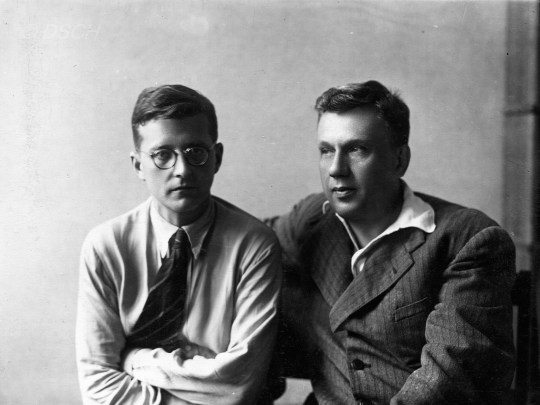
Pictured above is Dmitri Shostakovich with his best friend, Ivan Ivanovich Sollertinsky. The two of them met invariably in the years preceding, but struck up a friendship after hitting it off at a party of a mutual friend in 1927. The extroverted Sollertinsky paired well with the rather inward-facing Shostakovich. In particular, Shostakovich was taken by his witty, merry, and "entirely down-to-earth" personality. Sollertinsky was himself quite the scholar: he studied ballet, music, linguistics (he also spoke 26 languages), and philosophy, to name a few.
Sollertinsky, as well, was fiercely loyal to Shostakovich, as proven during the fallout in the wake of Muddle Instead of Music (an article published in January 1936 which dragged Shostakovich's opera Lady Macbeth of Mtsensk through the mud, resulting in much professional and personal turmoil for the composer). While many colleagues and indeed even friends were quick to jump on the Shostakovich-slandering bandwagon, Sollertinsky refused to do so, despite the harm it could have, and indeed did, cause his own career. Sollertinsky admired his friend so much that he broke a familial tradition of naming their firstborn sons "Ivan", and instead named his firstborn son "Dmitri".
The Second World War got in the way of their friendship, however. In June 1941, Nazi Germany broke the Molotov-Ribbentrop non-aggression pact and invaded the otherwise neutral Soviet Union. The Wehrmacht set their sights on Leningrad very early on, and by August, had nearly fully encircled the city. Sollertinsky was evacuated with the staff of the Leningrad Philharmonia on August 22nd, and Shostakovich was at the train station to see him off. Sollertinsky was evacuated to Novosibirsk, while Shostakovich was evacuated to Kuibyshev later that year. The two kept up their communications via letter (as they had over the past seventeen years), and in 1944 were giddy at the possibility of both living in the same city again (Shostakovich had, at that point, been moved by the government from Kuibyshev to Moscow). However their excitement was short-lived, as soon after returning to Novosibirsk after visiting Moscow, Sollertinsky died of heart complications on February 11th, 1944.
His death left Shostakovich heartbroken, and one that he never truly got over. He would still talk fondly about his friend Ivan Ivanovich Sollertinsky to his friends, family, and colleagues well into the 1970s.
Photo courtesy of the DSCH Shostakovich Journal.
#dmitri shostakovich#shostakovich#classical music#history#soviet union#music#ussr#russia#second world war#ivan sollertinsky#sollertinsky
15 notes
·
View notes
Text
Stalin's working day on June 22, when the war in USSR broke out, began at 3:30 am. Here we will go through it, bit by bit..
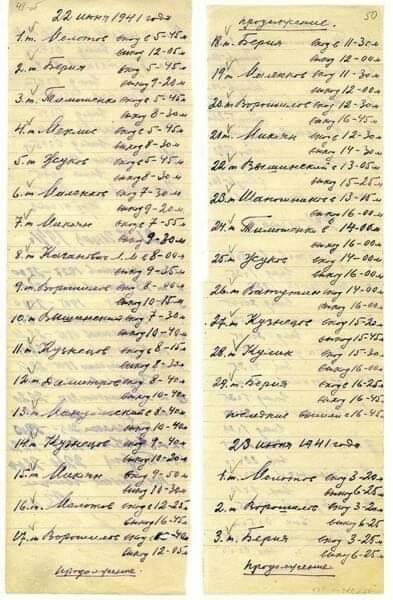
He held a meeting of the Politburo, signed priority documents to mobilize the country's forces to repel the aggressor, to strengthen the connection between the rear and the front. In addition, he received 29 heads of central political, military, economic and international bodies during the day. At the same time, some of them met with him more than once.
Molotov, Timoshenko, Zhukov, N. G. Kuznetsov, Shaposhnikov, Vatutin, Malenkov, Mikoyan, Kaganovich L. M., Voroshilov, Mehlis, Vyshinsky, Dimitrov, Manuilsky, Kulik and others worked with Stalin
On June 23, from 3:20 a.m. in the Kremlin, Stalin worked with Molotov. Until 6:25 he worked with Voroshilov, Timoshenko, Vatutin, N. G. Kuznetsov, Zhigarev and other comrades. Meetings and work with the summoned persons that day were continued by Stalin at 6:45 p.m. and lasted until 1:25 a.m. on June 24. A total of 21 people were accepted.
On June 24, from 4:20 p.m. to 9:30 p.m., Stalin received 20 party, state, military and economic workers. On June 25, from 01:00 to 05:50, he received 11 responsible employees and from 19:40 to 1:00 am already on June 26 another 18 responsible employees. On June 26, from 12:10 to 23:20, received 28 party, state and military leaders. On June 27, from 4:30 pm to 2:40 am on June 28, he received 30 party and state leaders, military leaders and economic leaders. June 28 from 19 hours 35 minutes received 21 party, state and military workers. The last visitors left Stalin at 00:50 on the night of June 29th.
On July 1, from 4:40 p.m. to 1:30 a.m. on July 2, Stalin received 23 responsible party, government, military, and economic workers. On July 2, from 11:10 p.m. to 3:20 a.m. on July 3, Stalin worked with Beria, Voroshilov, Molotov, Malenkov, and also with Kaganovich, Mikoyan, and Voznesensky; Shcherbakov and Peresypkin were also invited. On July 3, the day of his speech on the radio, from 21:00 to 01:55 on July 4, Stalin received 18 senior party, military and government officials.
“All these days and nights, Stalin,” Molotov testifies, “as always, worked, he had no time to get lost or lose the power of speech. To be confused — one cannot say, was worried — yes, but did not show outward. That he didn't worry is ridiculous. But he is not portrayed as he was — as a penitent sinner is portrayed! Well, that's absurd, of course.”
In the name of victory over fascist Germany, Stalin worked daily for 14-16 hours, leaving 8-10 hours for meals, short rests and personal affairs.
#joseph stalin#schedule#second world war#operation barbarossa#ussr#Note#document#Historical document#History
142 notes
·
View notes
Text
I have a lot of complicated feelings when it comes to what Neflix has done with the Witcher, but my probably least favourite is the line of argumentation that originated during shitstorms related to the first and second season that I was unlucky to witness.
It boils down to "Netflix's reinterpretation and vision is valid, because the Witcher books are not written to be slavic. The overwhelming Slavic aestetic is CDPR's interpretation, and the setting in the original books is universally European, as there are references to Arthurian mythos and celtic languages"
And I'm not sure where this argument originated and whether it's parroting Sapkowski's own words or a common stance of people who haven't considered the underlying themes of the books series.
Because while it's true that there are a lot of western european influences in the Witcher, it's still Central/Eastern European to the bone, and at its core, the lack of understanding of this topic is what makes the Netflix series inauthentic in my eyes.
The slavicness of the Witcher goes deeper than the aestetics, mannerisms, vodka and sour cucumbers. Deeper than Zoltan wrapping his sword with leopard pelt, like he was a hussar. Deeper than the Redanian queen Hedvig and her white eagle on the red field.
What Witcher is actually about? It's a story about destiny, sure. It's a sword-and-sorcery style, antiheroic deconstruction of a fairy tale, too, and it's a weird mix of many culture's influences.
But it's also a story about mundane evil and mundane good. If You think about most dark, gritty problems the world of Witcher faces, it's xenophobia and discrimination, insularism and superstition. Deep-seated fear of the unknown, the powerlessness of common people in the face of danger, war, poverty and hunger. It's what makes people spit over their left shoulder when they see a witcher, it's what makes them distrust their neighbor, clinging to anything they deem safe and known. It's their misfortune and pent-up anger that make them seek scapegoats and be mindlessly, mundanely cruel to the ones weaker than themselves.
There are of course evil wizards, complicated conspiracies and crowned heads, yes. But much of the destruction and depravity is rooted in everyday mundane cycle of violence and misery. The worst monsters in the series are not those killed with a silver sword, but with steel.
it's hard to explain but it's the same sort of motiveless, mundane evil that still persist in our poorer regions, born out of generations-long poverty and misery. The behaviour of peasants in Witcher, and the distrust towards authority including kings and monarchs didn't come from nowhere.
On the other hand, among those same, desperately poor people, there is always someone who will share their meal with a traveller, who will risk their safety pulling a wounded stranger off the road into safety. Inconditional kindness among inconditional hate. Most of Geralt's friends try to be decent people in the horrible world. This sort of contrasting mentalities in the recently war-ridden world is intimately familiar to Eastern and Cetral Europe.
But it doesn't end here. Nilfgaard is also a uniquely Central/Eastern European threat. It's a combination of the Third Reich in its aestetics and its sense of superiority and the Stalinist USSR with its personality cult, vast territory and huge army, and as such it's instantly recognisable by anybody whose country was unlucky enough to be caught in-between those two forces. Nilfgaard implements total war and looks upon the northerners with contempt, conscripts the conquered people forcibly, denying them the right of their own identity. It may seem familiar and relevant to many opressed people, but it's in its essence the processing of the trauma of the WW2 and subsequent occupation.
My favourite case are the nonhumans, because their treatment is in a sense a reminder of our worst traits and the worst sins in our history - the regional antisemitism and/or xenophobia, violence, local pogroms. But at the very same time, the dilemma of Scoia'Tael, their impossible choice between maintaining their identity, a small semblance of freedom and their survival, them hiding in the forests, even the fact that they are generally deemed bandits, it all touches the very traumatic parts of specifically Polish history, such as January Uprising, Warsaw Uprising, Ghetto Uprising, the underground resistance in WW2 and the subsequent complicated problem of the Cursed Soldiers all at once. They are the 'other' to the general population, but their underlying struggle is also intimately known to us.
The slavic monsters are an aestetic choice, yes, but I think they are also a reflection of our local, private sins. These are our own, insular boogeymen, fears made flesh. They reproduce due to horrors of the war or they are an unprovoked misfortune that descends from nowhere and whose appearance amplifies the local injustices.
I'm not talking about many, many tiny references that exist in the books, these are just the most blatant examples that come to mind. Anyway, the thing is, whether Sapkowski has intended it or not, Witcher is slavic and it's Polish because it contains social commentary. Many aspects of its worldbuilding reflect our traumas and our national sins. It's not exclusively Polish in its influences and philosophical motifs of course, but it's obvious it doesn't exist in a vacuum.
And it seems to me that the inherently Eastern European aspects of Witcher are what was immediately rewritten in the series. It seems to me that the subtler underlying conflicts were reshaped to be centered around servitude, class and gender disparity, and Nilfgaard is more of a fanatic terrorist state than an imposing, totalitarian empire. A lot of complexity seems to be abandoned in lieu of usual high-fantasy wordbuilding. It's especially weird to me because it was completely unnecessary. The Witcher books didn't need to be adjusted to speak about relevant problems - they already did it!
The problem of acceptance and discrimination is a very prevalent theme throughout the story! They are many strong female characters too, and they are well written. Honestly I don't know if I should find it insulting towards their viewers that they thought it won't be understood as it was and has to be somehow reshaped to fit the american perpective, because the current problems are very much discussed in there and Sapkowski is not subtle in showing that genocide and discrimination is evil. Heck, anyone who has read the ending knows how tragic it makes the whole story.
It also seems quite disrespectful, because they've basically taken a well-established piece of our domestic literature and popular culture and decided that the social commentary in it is not relevant. It is as if all it referenced was just not important enough and they decided to use it as an opportunity to talk about the problems they consider important.
And don't get me wrong, I'm not forcing anyone to write about Central European problems and traumas, I'm just confused that they've taken the piece of art already containing such a perspective on the popular and relevant problem and they just... disregarded it, because it wasn't their exact perspective on said problem.
And I think this homogenisation, maybe even from a certain point of view you could say it's worldview sanitisation is a problem, because it's really ironic, isn't it? To talk about inclusivity in a story which among other problems is about being different, and in the same time to get rid of motifs, themes and references because they are foreign? Because if something presents a different perspective it suddenly is less desirable?
There was a lot of talking about the showrunners travelling to Poland to understand the Witcher's slavic spirit and how to convey it. I don't think they really meant it beyond the most superficial, paper-thin facade.
#The witcher#Sorry if its convoluted I just got reminded of something and it made me a little angry#and as I had this conversation a lot of times I've decided to put it into written text#sorry about being bitter#but these are some of my favourite books and I'm still upset when I get reminded how badly they were treated in the recent adaptation#I'm not saying you should never change anything#But it's good to have enough background to understand why some things are the way they are in the original#and to understand what the source material is about#we don't talk about particular character's looks or something (altough I feel they could care more about it too)#but central themes tropes and motifs#long post#it may seem like I'm talking from a high horse here#people are welcome to interpret literature however they want#Nobody has a monopol on themes#I just think that in this particular case the cultural context influences the worldbuilding#and if changed it doesn't have the same impact anymore#meta
154 notes
·
View notes